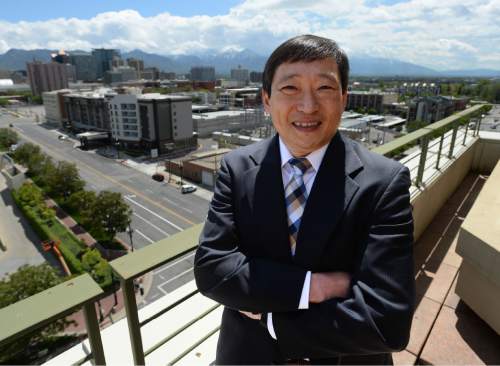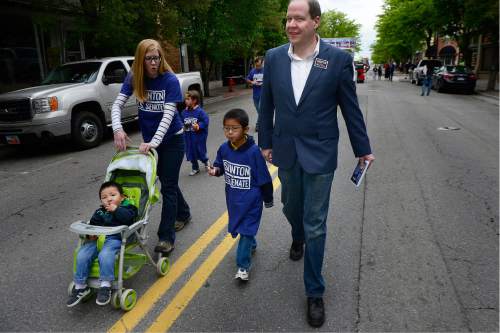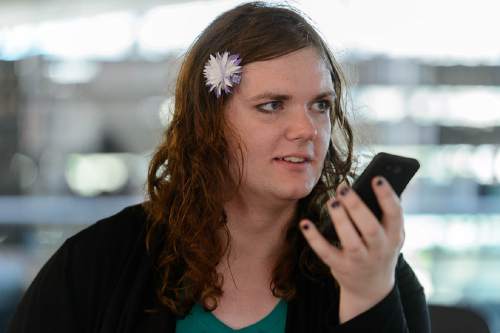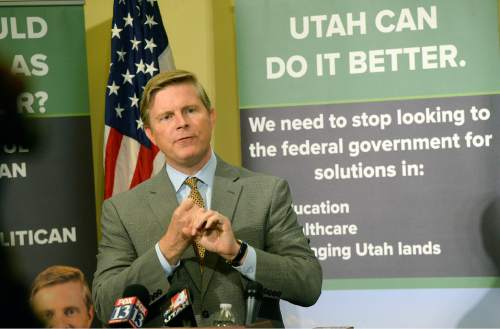This is an archived article that was published on sltrib.com in 2016, and information in the article may be outdated. It is provided only for personal research purposes and may not be reprinted.
Tuesday's primary election will determine the Republican nominee for governor (Gov. Gary Herbert vs. Jonathan Johnson) and in the 3rd Congressional District (Rep. Jason Chaffetz vs. Chia Chi-Teng), and the Democratic nominee for U.S. Senate (Jonathan Swinton vs. Misty K. Snow).
But primary voters will also choose the final winners, not just party nominees, in some races statewide.
That's because only Republicans filed for office in three legislative races being contested Tuesday.
"It's pretty typical not to have a Democrat run down here," said Walt Brooks who is facing Steven Kemp in House District 75 to see who will replace retiring Rep. Don Ipson, R-St. George.
"Washington County is the most conservative county in Utah, which is the most conservative state in the nation. So the Republican primary in this district has probably been THE election for some time," Kemp added.
The other two races where the GOP primary will determine the final winner are House District 57 between Rep. Brian Greene, R-Pleasant Grove, and Xani Haynie; and District 67 between Rep. Marc Roberts, R-Salem, and Richard D. Moore.
Two other Senate races are almost final elections. The winners there will face only third-party candidates, with long-shot odds.
Those are in Senate District 15 between Sen. Curt Bramble, R-Provo, and former Rep. Chris Herrod; and Senate District 14 between former Rep. Morgan Philpot and Daniel Hemmert to replace retiring Sen. Al Jackson, R-Highland.
"The election Tuesday is the chance for voters to have their voice heard," said Haynie — who qualified to face Greene by using SB54's newly created option of gathering signatures. She said party conventions had actually decided winners in that district for some time.
"If I had not gathered signatures, 114 delegates at the convention would have decided the winner for everyone in our district," she said. "I'm glad voters here will at least have a chance to choose this year."
Six other legislative races this year were decided at party conventions, where candidates won by big enough margins to eliminate in-party rivals (who had not chosen to gather signatures), and no one else from other parties had filed.
Those early victors included Republican Jefferson Moss in Utah House District 2, and Reps. Rebecca Chavez-Houck, D-Salt Lake City; Mike Kennedy, R-Alpine; Kay Christofferson, R-Lehi; Keith Grover, R-Provo; and Norm Thurston, R-Provo.
Sixteen other legislative candidates essentially won without any votes cast at all — they are unopposed because no one from any party filed against them.
Those 16 include Republican Val Potter in House District 3; Sens. Ralph Okerlund, R-Monroe; and Lyle Hillyard, R-Logan; and Reps. Ed Redd, R-Logan; Mike Schultz, R-Hooper; Timothy Hawkes, R-Centerville; Joel Briscoe, D-Salt Lake City; Angela Romero, D-Salt Lake City; Brian King, D-Salt Lake City; Patrice Arent, D-Millcreek; Derrin Owens, R-Fountain Green; Jon Stanard, R-St. George; Francis Gibson, R-Mapleton; Mike McKell, R-Spanish Fork; John Westwood, R-Cedar City; and Lowry Snow, R-Santa Clara.
In short, 22 of 90 legislative races this year were decided before the primary — and three (maybe five) more will be decided on Tuesday.
Following is a look at some of the key races where voters will have a say on Tuesday.
—
Governor's race • Despite enjoying one of the highest approval ratings of any governor in the country, Herbert received fewer delegate votes than his challenger at the state Republican convention. Johnson came out ahead by a 55-45 percent margin. That was, in part, because delegates were upset that Herbert signed SB54 into law and had gathered signatures to ensure he would qualify for the primary. He also was criticized for his past support (he has since changed position) for Common Core minimum standards in math and English and related SAGE testing.
But Herbert had a commanding 69-24 percent lead among likely GOP primary voters in a recent Salt Lake Tribune-Hinckley Institute of Politics poll.
Fundraising has been an issue in the race.
Herbert was secretly recorded telling lobbyists that he would be "Available Jones" — a reference to a character in the Li'l Abner comic strip who would do anything for a price — in arranging his schedule to hold private meetings with donors.
Herbert raised $4.4 million since his last election. "It is clear Available Jones has been making himself available — for a price — for quite some time and at an alarming rate. What results has he promised to each of these donors?" Johnson's campaign manager, Dave Hansen, said this week.
But Herbert's campaign said the donations show he has broad support, and he has attacked Johnson for taking $850,000 from his business partner, Overstock CEO Patrick Byrne. The Herbert campaign suggested Johnson would be Byrne's puppet if he is elected and the governor called Byrne Johnson's "sugar daddy."
Herbert has campaigned saying he helped Utah to one of the strongest economies in the country, and leads a state government often ranked among the most efficient. Johnson has attacked Common Core educational standards, tax increases and Herbert's refusal to hold multiple debates before the election.
—
U.S. Senate race • Democrats will choose between Swinton — a marriage counselor eager to find common ground with Republicans — and Misty Snow, a grocery cashier and transgender woman. The winner will face Sen. Mike Lee, R-Utah, who is seeking a second six-year term.
The Tribune-Hinckley Institute poll conducted by SurveyUSA this month showed that if the general election were held now, Lee would beat Swinton by 50-39 percent margin. Lee would beat Snow by a 51-37 percent margin.
A self-described conservative Democrat, Swinton says his work to help couples learn to compromise is just what dysfunctional Washington needs. And he believes his middle-of-the-road approach will appeal to independents and maybe even some Utah Republicans who don't favor tea-party darling Lee.
Swinton was challenged at the Democratic state convention by Snow largely on the issue of abortion. Swinton is pro-life and in an op-ed in The Salt Lake Tribune called for a federal investigation of Planned Parenthood. That, combined with his Mormon faith, didn't go over with some Democratic delegates.
Snow says she wanted Democrats to have a more liberal choice than Swinton, so she ran.
"I want to present a real alternative to Republicans rather than someone who is going to run on being Republican-light," Snow said. "I'm not running because I'm transgender. I just happen to be transgender."
—
3rd Congressional District • Chaffetz and Teng, a BYU professor and former Microsoft engineer, have been waging a sometimes bitter campaign.
It even prompted Chaffetz to call Teng a "political hack" who is spreading misleading information, and said he is surrounded "by some goons that use old, tired tricks."
That came after Teng filed a complaint with the Federal Election Commission alleging that Chaffetz may be improperly benefiting personally from campaign donations, which Chaffetz denies.
Teng has poured a half-million dollars of his own money into his campaign, 95 percent of the total he has raised. "I'm not going out to ask for special-interest money, because they always come with strings attached," he said
He said the $1 million that Chaffetz raised this cycle came largely from special interests. Chaffetz said his many donors shows broad support. "When they make those donations, there's no strings attached. I'm still a free agent to vote however I feel best serves the interests of Utah, and that's what I do."
Teng contends that Chaffetz has become part of the Washington establishment, and a change is needed to help balance budgets and stop tax hikes.
Chaffetz says he has become a powerful voice for Utah in Washington, and has used his chairmanship of the House Oversight Committee to ferret out problems with the IRS, Secret Service, Homeland Security and the Benghazi scandal — and promises to keep close watch on whomever becomes the next president.
—
Voting by mail • Twenty of Utah's 29 counties are voting primarily by mail in this election, which is bringing some special reminders.
"Ballots must be postmarked by Monday. The key is it must be postmarked, not just mailed. If there is any doubt about whether it will be postmarked on time, people should take their ballots to one of our in-person voting centers or our drop boxes," said Salt Lake County Clerk Sherrie Swensen.
Each county with by-mail voting will have at least one in-person voting center open on Tuesday, and Salt Lake County will have 24. Sites are available on the clerks' webpages.
"If people have misplaced their ballot, or didn't get a ballot for any reason," they should go to a voting center where they may obtain replacements, she said.
Swensen also urges voters to remember to sign their return envelopes, which are used to verify that they cast their own ballots. Without those signatures, ballots will not be counted.
If people have not yet registered to vote, Election Day registration at voting centers is available in eight counties as part of a pilot project: Cache, Davis, Kane, Millard, Salt Lake, San Juan, Sanpete and Weber. Those wishing to register should bring identification and proof of residence, such as a utility bill.
As of Friday, Swensen said 19 percent of registered Salt Lake County voters had already returned ballots. She expects many are waiting until the last minute to watch late developments, and projects total turnout will be about 27 percent.
That would be far higher than any other June primary in Salt Lake County, she said. Four years ago, when the primary included a presidential primary and favorite-son Mitt Romney was on the ballot, the turnout was only 18.8 percent. "We've already passed that," Swensen noted.
By-mail voting should allow quick announcement of initial results in counties using it, Swensen said. Pre-processing in her county will allow it to release initial results shortly after polls close at 8 p.m. at voting centers.
But final results may not be known for days because many ballots may still be in the mail. Swensen said changes in state law now allow releasing updated counts on the Friday after the election, again on the next Tuesday, then the next Friday. "So we don't have to wait for two weeks wondering about results."
—
Millcreek mayor • Voters in Utah's soon-to-be-newest city, Millcreek, will weigh in Tuesday to narrow the field of nine mayoral hopefuls to two and also select the general election candidates in four city council districts. (See separate story).









